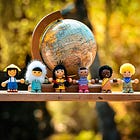A Life Shaped by Five Languages
If languages shape us in different ways, speaking five of them probably means I look like a piece of Gaudí’s 'trencadis' mosaic.
Romanian
My life’s story started in Romanian.
A language that might seem slightly harsh to the unaccustomed ear, but to the newborn me it sounded like life itself. Mother’s lullabies — I want to believe she sang some — and father’s cooing sounded like the only language there ever would be in my new little universe.
Romanian sounds like children’s poems and songs sung in high-pitched voices. It sounds like communist recitals during the May 1st or August 23rd public parades. It’s the sound of standing in line to buy bread from the ‘bread factory’ together with the other kids from the neighborhood.
It’s the buzz of bees atop my head and grandma’s advice on handling a beehive frame barehanded. It’s a conversation with grandpa over the shade of red best used as we colored a basket of apples in a book. More than anything, Romanian sounds like the books I read alone, splayed on the Persian bedroom carpet, during most summers of my childhood. And later, like the first declaration of teenage love.
Romanian sounds like my exclamation in surprise when I was 3 or 4 years old seeing snow for the first time and calling it ‘sea-water foam’, the only fluffy white stuff laying on the ground I’d known until then.
It sounds like praise for good grades and diplomas, which I misheard for parental love.
It’s a strange feeling to forget the right words when speaking it now, to have to translate from English or Spanish to get to the right phrase. What is the mother tongue then, part of our fiber and becoming, if one can forget parts of it so completely?
French
At 7 years old, new sounds entered my world, the sounds of the guttural French.
The new language came with an instruction manual, unlike my first, the mother tongue. It wasn’t a fluid children’s song, but individual words: table, chaise, porte, crayon, written in a colorful book. And with one unforgettable word, zubluc, we found in a reader that was foreign even to my teacher.
But once I discovered Michael Jackson’s music, French instantly took a second spot to English in my heart. My private French tutor famously said that if Michael Jackson had sung in French I’d have mastered the language easier.
Years later, French also became the language of love.
He was not my first love, but he was mon premier amour, and that was supposed to make all the difference.
French became the language of a new home for a while, although I never lived in France. I became a daughter-in-law in French, I felt loved in French — both in words and in the very French language of baguettes and croissants — by a family directly across the European continent from my own family of origin. French was the language of Brittany’s cow-piss rain, and of more types of cheese than I can name anymore.
It represents the emotion of greeting a baker with that ‘Bonjour, monsieur!’, increasing the pitch with every syllable, and of speaking with old sellers of lavender bouquets in Sault-en-Provence. It was easy to think you’ve become French yourself immersing in a middle-of-nowhere village in France like that.
French was the language of ‘I do’ and then of ‘I don’t anymore’, the predominant language for a decade.
English
English is in every fiber of my body today, it’s a lifetime love affair.
A lover I grew up with, evolved with, a lover so close to me for almost all my life that I don’t know who I’d be without her — the English language. It’s not a language anymore, it’s simply the contents of my mind, the contents of my dreams.
I discovered English thanks to Michael Jackson’s songs when I was 10, jotting down what I heard and trying to make sense of it. English meant the voice of the lady on the audio cassette pronouncing all the London sights, from Trafalgar Square to Westminster Abbey. Until one day it turned into real sounds spoken by real people during the summer school I attended at Cambridge. It was the language of essays written for state competitions every school year.
English was a portal to a whole new life when I moved to the US to study for a master’s degree. It permeated every corner of my life, going beyond school textbooks and music lyrics. It was part of my daily food store walks, in my friendships, new loves, part of legal or healthcare paperwork.
English stopped being a language, it started being myself.
German
German entered my life during high school, through private language classes, after English and French were not a challenge anymore. I loved the logic of German, the long compound words built like Lego pieces clipped together neatly.
Years later, when I moved to Frankfurt, those clipped Lego pieces, neatly arranged on the pages of my old textbook, turned into sharp-edged boulders. German was suddenly an avalanche, coming down a steep mountain path and I happened to be in its way.
German was for brief interactions to buy my favorite cherry pastry on my way to work in the mornings, for navigating the train system. But I never entered into the bowels of German, just like I never entered in the home of any local.
It remained on the outskirts of my social circle as much as on the outskirts of my heart.
I’m always surprised I can speak German a little better than I think I do. It comes out as if from a drawer in the brain where all the logical elements are stored. Somehow I manage to string together the words in that peculiar German order.
Expressing feelings in a language is what makes that language enter your bones.
German stayed at the periphery of my sentiments, although I assimilated the building blocks. Tightly clipped Lego blocks make up a nice wall, but if you step on them barefoot, you might get a bruise or two.
I never loved in German, and that probably made all the difference.
Spanish
The exotic dream I didn’t even know I had until my mid-twenties.
Spanish was a breath of life that opened my lungs again. Unlike with German, once I learned to say the first sentences in Spanish, I dove in head first. It was like touching the still surface of a lake with your toe and watching the ripples form, larger and larger. I wanted to submerge more and more of myself into the lake, I wanted to let it overcome my entire body and mind with its force.
Spanish entered my life when I lived in Miami. My dark hair and complexion made people doubt I didn’t speak it. I started learning enough to order my lunch takeaway at that place in downtown Miami, around the corner from my office, Pollo Tropical.
Years later, Spanish seeped into my bones, when I went to Mallorca for the first time.
The ochre and yellow shades of the buildings in the old town were so vibrant, the orange trees, shocking in numbers. People seemed to sing and laugh instead of speaking the language. I was sold. Spanish became the language of my new home, the fourth country I had moved to before I turned 30.
Spanish was also the language of tragedy, when I heard a local doctor give me the final verdict about my infertility.
Spanish was the language in which I read the small print on my divorce papers.
Spanish was relishing in the joy of freshly pressed orange juice and also the loneliness of summers spent on my own for a few years.
It was the excitement of learning to grow tropical plants and also the frustration of low-paying jobs, in which my previous international experience was not valued.
Spanish is a language of contrasts in my life, but still nested tightly in my heart. Because I don’t just speak it, I feel it. I enjoy rounding my mouth around full vowel words. Reading literature in Spanish is lush, the vocabulary is richer in nuances than English could ever be.
When I travel abroad and I hear Spanish being spoken, my shoulders relax and I feel safe, closer to home.
Spanish is the arrival at a home I never knew I longed for.
This essay was inspired by Elif Shafak’s essay Different Emotions in Different Languages.









Love this piece so much! Fascinating how the different languages taste, sound, feel and look to you 😍 I can definitely relate to the love for English and understand how you view German 😂
So lovely to read. I also have 5 languages. With the difference of your French with my Hungarian.
I have the exact same feelings about German, love the logic in it, but not a love language😁
I need to start reading in Spanish though!